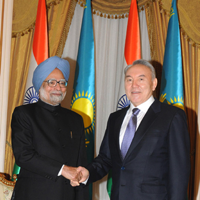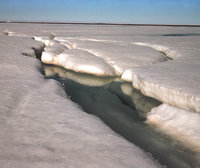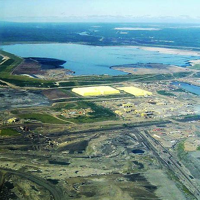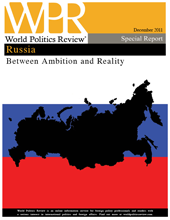Russian President Dmitry Medvedev traveled to Prague earlier this month to sign a deal with Czech President Vaclav Klaus establishing a joint venture on the exchange of civilian nuclear technology. In an email interview, Petr Kratochvíl, deputy director of the Institute of International Relations in Prague, discussed Russia-Czech Republic relations. WPR: What is the nature of Russia-Czech Republic relations since the end of the Cold War? Petr Kratochvíl: Roughly speaking, we can distinguish three fundamental phases. The first covers the period from the Velvet Revolution in 1989 to around 1994 and included the dissolution of both the Warsaw Treaty and […]
Energy Archive
Free Newsletter
Turkmen President Gurbanguly Berdymukhamedov paid a four-day visit to China last month. In an email interview, Kathleen J. Hancock, an associate professor of political science at the Colorado School of Mines, discussed China-Turkmenistan relations. WPR: How have political and economic relations between China and Turkmenistan evolved over the past decade? Kathleen J. Hancock: Since Turkmenistan’s independence in December 1991, its relationship with China has revolved around the supply and demand of natural gas.* While estimates have shifted over time, Turkmenistan is currently estimated to have 265 trillion cubic feet of proven reserves, making it the 12th-most-endowed country, according to the […]

Editor’s note: This is the second in a two-part series on India’s strategic engagement in Central Asia. Part one examined ties with Tajikistan and Kyrgyzstan. Part two examines ties with Uzbekistan and Kazakhstan. Two decades of Indian engagement with Central Asia have produced relationships that are now poised to move beyond the energy and transit sectors toward more-diversified commercial investments. However, this evolution takes place against the backdrop of NATO’s imminent withdrawal from the region, at a time when India still sees national armies as the most sustainable institutions in Central Asia. In this context, Indian Army chief Gen. V.K. […]
Turkey and China signed a deal last month for the construction of an underground natural gas storage facility at Lake Tuz in Turkey. In an email interview, Selcuk Colakoglu, an associate professor at the International Strategic Research Institution (USAK) in Ankara, Turkey, discussed relations between Turkey and China. WPR: What is the nature of trade relations between Turkey and China, including the main sectors of trade and direct investment? Selcuk Colakoglu: One of the main motivations of Ankara’s rapprochement with Beijing in the late-1990s was to gain economic benefits for Turkish businessmen in China. However, the increasing trade volume with […]

Recent moves by Russia, Norway and even China have put a spotlight on the High North, where warming temperatures have led to greater seasonal ice melt and access. With increased future activity in the Arctic inevitable, the United States must begin to address some of the potential security challenges that could result. As part of this effort, the European Command (EUCOM) — the U.S. military command responsible for the Arctic — must leverage the progress made by the Arctic Council in nonsecurity matters to facilitate expanded security cooperation efforts in the region. The Arctic Council has successfully raised awareness of […]

The United States is on the verge of an industrial renaissance, according to energy experts enthusiastic about technological advances surrounding the “fracking” of shale gas and the processing of “tight oil.” America is sitting on a century-worth of natural gas, and the Western hemisphere boasts five times the reserves in unconventional oil as the Middle East claims in the conventional category. Suddenly, all our fears of resource wars with China and never-ending quagmires in Southwest Asia seem to melt away, heralding with great certainty another American century based on the promise of energy independence. As “deus ex machina” moments go, […]

Over the past decade, Russia’s resurgence has led to conflict and reset with the U.S. and a muscular, energy-based reassertion of influence in Eurasia and beyond. But Moscow’s efforts to regain its tarnished superpower status are threatened by fundamental weaknesses that could undermine its ambitions. This WPR report examines Russia, between ambition and reality. Below are links to each article in this special report, which subscribers can read in full. Not a subscriber? Purchase this document for Kindle or as a PDF from Scribd. Or subscribe now. Strategic Vision Strategic Posture Review: RussiaRichard Weitz November 30, 2011 Re-Examining Russia’s Putin-Medvedev […]
